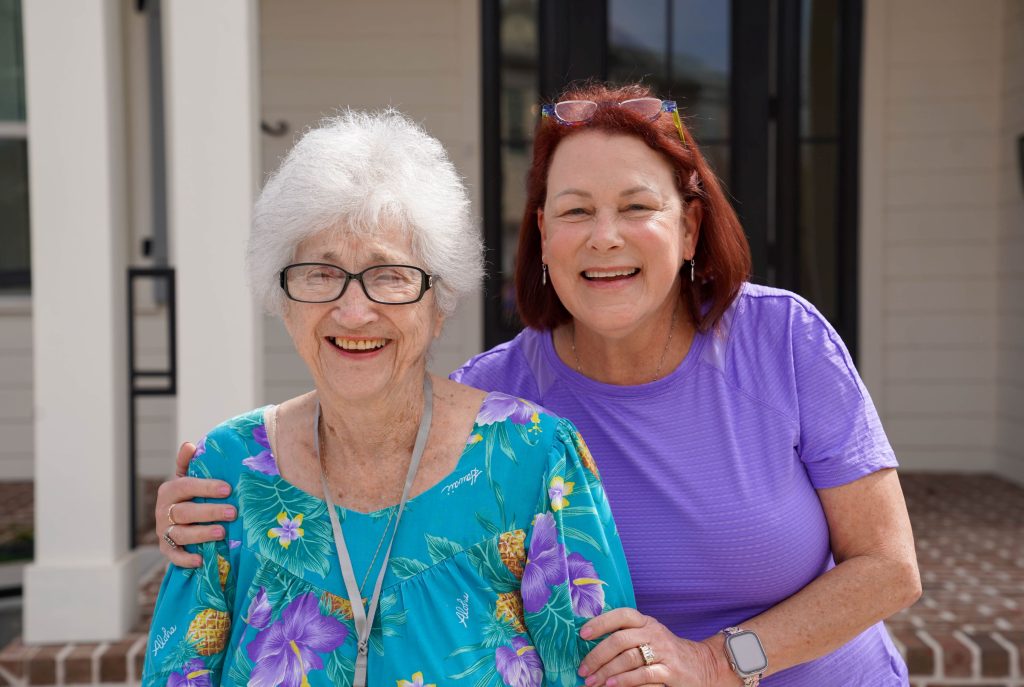
OUR PERSONAL CARE SERVICES
- Bathing
- Grooming
- Feeding
- Toileting
- Dressing
- Housekeeping
- Lifting and Transferring
- Medication Management
- Transportation
- Memory Care Support
- Cooking / Meal Prep
- Personal Hygiene

By choosing residential assisted living, families can rest assured their elderly loved ones are receiving top-notch care in a warm, nurturing environment. The blend of professional caregiving and an actual residential home makes this an unparalleled choice for seniors to flourish in their golden years. Moreover, the home atmosphere fosters a sense of community among residents, combating feelings of loneliness and social isolation common in traditional, larger assisted living communities.
At Peristyle Residences, our assisted living homes are designed to adapt to the changing needs of their residents. As seniors’ requirements evolve, the level of care can be adjusted accordingly, providing peace of mind for both residents and their families. This flexible, person-centered approach sets Peristyle Residence apart, making it a great living environment for those seeking dignified person-centered care.

Our caregivers are dedicated to ensuring each and every resident receives exceptional, personalized care – for their health, safety, wellbeing and comfort.
Family members are often faced with the difficult decision of when to provide care for their elderly relatives. This decision varies by individual and situation, but generally, answering a series of questions about the senior’s ability to perform activities of daily living (ADLs) will help determine if assisted living is necessary. It’s important to note that there are many levels of senior housing, including independent living, memory care, and skilled nursing, so the following questions are critical to answer if your elderly loved one is struggling with ADLs.
The right time for assisted living involves both personal choice and safety.
For some, personal care is an option from the onset due to a lack of ability to perform Activities of daily living. On the contrary, some find they can continue to live independently but eventually get to a point where they require assistance around the clock. Others may be unable to live alone and need help with multiple daily tasks.
If you fear your elderly loved one requires ongoing medical services, then consider relocating them to a nursing home. Your elderly loved one’s health care needs should be prioritized when deciding which level of care is appropriate. You may also want to consider a retirement community and weekly home care if your elderly loved one can perform most of the questions on the above list.
Living independently in the comfort of your own home may not be the safest option if you are a senior citizen requiring assistance with activities of daily living. As the ability to care for oneself declines, exploring ways to protect your quality of life without risking your health or safety is a good idea. Assisted Living, also known as personal care, offers help with everyday tasks to those with disabilities and older adults. Assisted living allows seniors to maintain their independence as much as possible while providing necessary assistance to navigating day-to-day life. Quality of life is expected to immediately increase when a senior relocates to an assisted living community or home.
At Peristyle Residences, our team of healthcare professionals takes pride in providing exceptional assisted living and memory care services in the greater New Orleans area. Please contact us for a tour of one of our senior living residences today. You can also visit our FAQ’s page to read commonly asked questions by families.
One of the most challenging decisions you will ever have to make is choosing where your elderly loved one lives when it becomes evident that assisted living is necessary. The best way to decide on the appropriate senior housing option is by determining what level of care your elderly loved one needs and then looking at available options in your area. You also should read online reviews on various assisted living communities to hear feedback from current and past residents. Make sure to check Google, Bing, and Yahoo reviews.
Lastly, you want to make sure any home you choose is close to your home and work, making visiting more accessible and cutting down on transportation costs and time spent away from work or home duties.
Not all assisted living communities provide memory care support for their residents. Most residential care homes, such as Peristyle Residences, specialize in Alzheimer’s, dementia, aphagia, Parkinson’s, and other forms of memory impairment.
Some assisted living homes are more expensive, while others are more affordable. You should expect a monthly rate between $4,000 – $6,000 for assisted living services. This price should include three meals a day and snacks. Please keep in mind that memory care communities may charge more. You should look at your budget when deciding on an assisted living home.
Respite care is short-term assisted living care for individuals trying out a senior care community or only requiring part-time care. Not all assisted living homes provide respite care. At Peristyle Residences, we offer short-term care at our group homes.